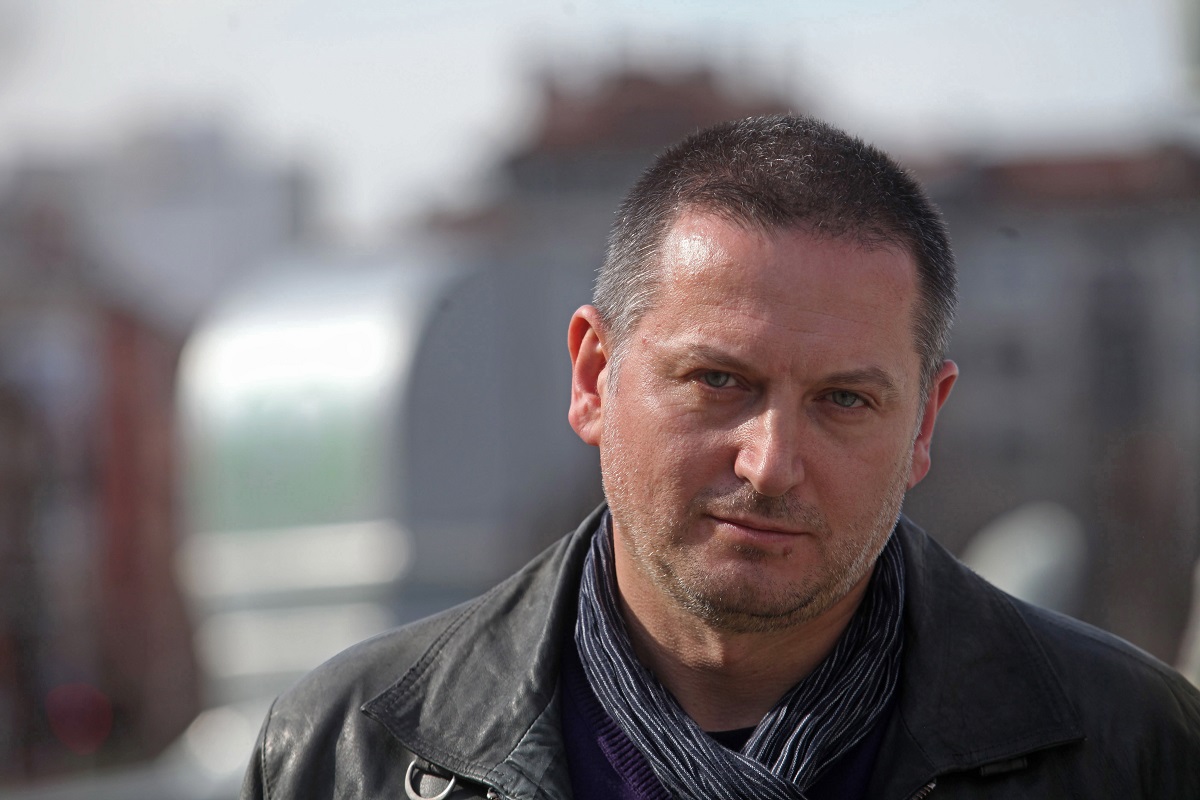Georgi Gospodinov (born in 1968 in Bulgaria) is a poet, writer, and playwright. His books have been translated into more than 25 languages. He became internationally known with his “Natural Novel” (1999). His second novel, “The Physics of Sorrow,” was the winner of the Central European Angelus Award (2019) and the Jan Michalski Prize (2016) and a finalist for the PEN America Translation Prize and the Brücke Berlin Preis. According to The New Yorker, “Georgi’s real quest in ‘The Physics of Sorrow’ is to find a way to live with sadness, to allow it to be a source of empathy and salutary hesitation…” In 2017–2018, Gospodinov was awarded the New York Public Library fellowship at the Cullman Center. “Blind Vaysha,” a short animation (dir. Theo Ushev) based on Gospodinov’s short story, was an Academy Award nominee in 2017. He is the author of 15 books of poetry, fiction, nonfiction, plays, several scripts for short feature films, and projects in the field of memory of the recent past, everyday life, and ideological traumas. He is affiliated with the Institute for Literature, Bulgarian Academy of Science, Sofia. His latest novel, “Time Shelter,” came out in March 2020, in the peak of the pandemic and now is forthcoming in Aufbau (Germany), Gallimard (France), Liveright/Norton (USA), etc. In 2010 he was a guest at the Literary Colloquium Berlin with the kind support of the German Federal Foreign Office.
Georgi Gospodinov wurde 1968 in Jambol, Bulgarien, geboren, studierte Bulgarische Philologie in Sofia, redigierte seit 1993 eine Literaturzeitung, war Kolumnist der Tageszeitung Dnevnik und arbeitete am Literaturinstitut der Bulgarischen Akademie der Künste. 1992 debütierte Gospodinov mit dem Lyrikband »Lapidarium«. Einem internationalen Publikum wurde er mit seinem ersten Roman bekannt, dem »Natürlichen Roman« (1999), von dem Übersetzungen in mittlerweile 23 Sprachen vorliegen. Auch als Bühnen- und Drehbuchautor (der Kurzfilm »The Ritual« war Teil des Eröffnungsprogramms der 55. Internationalen Filmfestspiele Berlin) war Gospodinov erfolgreich. Sein Prosaband »Und andere Geschichten« stand auf der Longlist für den Frank O‘Connor Award. Auf Deutsch wurden die Erzählungen »Gaustín oder Der Mensch mit den vielen Namen« (2004) veröffentlicht, in der Folgejahren erschienen bei Droschl Gospodinovs »Natürlicher Roman« (2007), »Kleines morgendliches Verbrechen«, eine Auswahl von Gedichten (2010), der Roman »Physik der Schwermut« (2014) und der Erzählband »8 Minuten und 19 Sekunden« (2016). 2016 wird ihm der Jan Michalski-Preis für »Physik der Schwermut« zuerkannt. 2021 erhält Georgi Gospodinov den Usedomer Literaturpreis. 2010 war er mit freundlicher Unterstützung des Auswärtigen Amts zu Gast im Literarischen Colloquium Berlin.
Georgi Gospodinov (born in 1968 in Bulgaria) is a poet, writer, and playwright. His books have been translated into more than 25 languages. He became internationally known with his “Natural Novel” (1999). His second novel, “The Physics of Sorrow,” was the winner of the Central European Angelus Award (2019) and the Jan Michalski Prize (2016) and a finalist for the PEN America Translation Prize and the Brücke Berlin Preis. According to The New Yorker, “Georgi’s real quest in ‘The Physics of Sorrow’ is to find a way to live with sadness, to allow it to be a source of empathy and salutary hesitation…” In 2017–2018, Gospodinov was awarded the New York Public Library fellowship at the Cullman Center. “Blind Vaysha,” a short animation (dir. Theo Ushev) based on Gospodinov’s short story, was an Academy Award nominee in 2017. He is the author of 15 books of poetry, fiction, nonfiction, plays, several scripts for short feature films, and projects in the field of memory of the recent past, everyday life, and ideological traumas. He is affiliated with the Institute for Literature, Bulgarian Academy of Science, Sofia. His latest novel, “Time Shelter,” came out in March 2020, in the peak of the pandemic and now is forthcoming in Aufbau (Germany), Gallimard (France), Liveright/Norton (USA), etc. In 2010 he was a guest at the Literary Colloquium Berlin with the kind support of the German Federal Foreign Office.
-
24 Donnerstag
Odessa Transfer
Im Rahmen des Festivals »Neue Ufer. Das Schwarze Meer in Europa«
Veranstaltungen mit Georgi Gospodinov
2009
September











